Note
What's an alternative to "host" as a system term? We've got a fictive who's a parasite and he feels kinda awkward calling me that because of the implications.
You know, host is actually a weird term when you think about it, since it does sort of give the impression of parasites or demonic possession.
It doesn't really seem like a word that would just refer to the headmate who fronts the most.
Personally, I think a more accurate term would be "Primary Fronter." That is obviously a mouthful, but it could be shortened to Primary or even Prime.
106 notes
·
View notes
Text
The Plurality Of... Batman! (Failsafe)
An anon mentioned this arc to me which they said depicted Batman as a plural character. So I decided to give it a read!
The Beginning
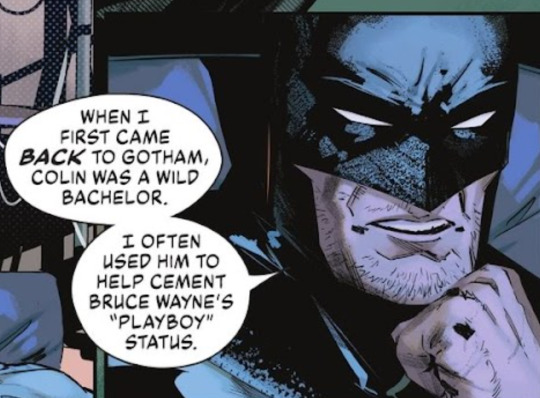
The actual plural stuff doesn't really start until the third issue of the arc, but this was something that popped out at me immediately.
We never really paid attention to it before, but Batman does this in a lot of things, doesn't he? Referring to "Bruce Wayne" as a separate person. Especially while dressed as Batman. There are other phrasings of this that could have been used. "I often used him to cement my playboy status," being the most obvious or even "I often used him to help cement my playboy status as Bruce Wayne."
Other superheroes don't do this as often, do they? I know it occasionally comes up when living a double life, but it doesn't seem nearly as common when talking to people who know both identities as it does with Batman.
Anyway, Robin is worried about Bruce not having happiness in life, and mentions that the Bat Family is concerned about him not being just "Bruce Wayne" anymore. That he's always Batman all the time.

Probably not the best thing for a secret identity when Batman starts appearing out in the day right after Bruce Wayne loses his day job... but when has he ever cared about keeping his secret identity secret?
This sets up an important conflict in the story. That Bruce needs to be Batman and Bruce Wayne both. He needs that balance in his life.
After being framed for a murder, a Failsafe is activated meant to kill Batman.
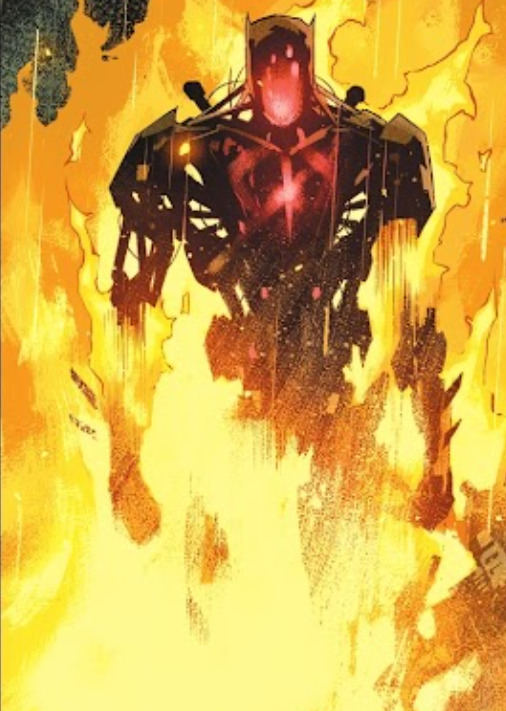
Bruce fights it, it seems familiar, but he can't place it. Which Bruce realizes is very wrong for somebody who has a perfect memory. (Because of course he has a perfect memory.)
That leads us to...
The Batman of Zur-En-Arrh

The Batman of Zur-En-Arrh first appeared in the silver age as an actual alien Batman. He was later reintroduced in the modern era as an alternate personality in Batman R.I.P. from 2008. I haven't read that so won't be able to comment on it, but if enough people like this, I might check out RIP and do a post on it too!
The third issue of this arc opens with a flashback that took place after the Tower of Babel storyline. This is the famous storyline where Bruce created plans to deal with all members of the Justice League in the event they went bad. Part of the flashback again highlights the duality of Bruce and Batman as almost being separate individuals.

Again, none of this is actually presented as a plural thing, but I do think it's interesting to note. If only to contrast the clear plurality we see with Zur.
Superman challenges Bruce, asking how the Justice League can be contingencies when Bruce has planned for everything.
Then the story returns to the present.
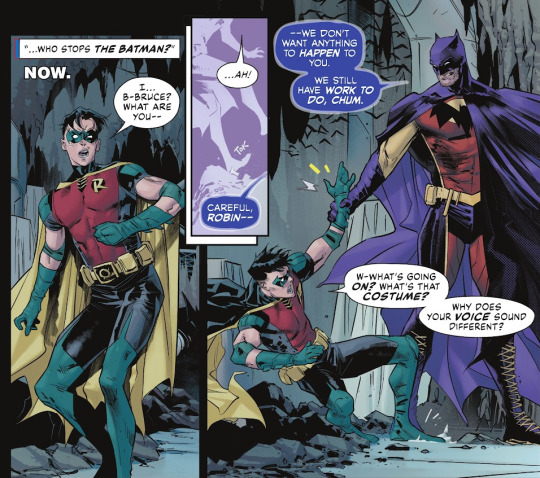
Here we have a Batman who is talking different, acting different, dressed different. Even his speech bubbles are colored differently to signify the switch.
And he is using plural pronouns when he speaks.
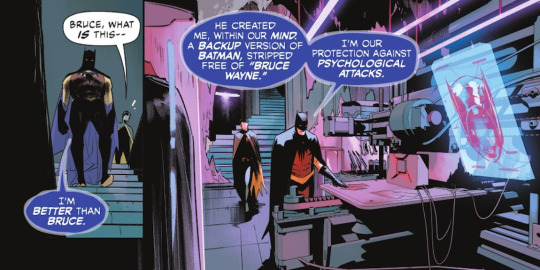
He declares himself better than Bruce. A Batman without a Bruce Wayne who was intentionally created by Bruce.
I love the use of "our mind" here, showing that he thinks of them as separate individuals.
It's revealed that the Batman of Zur-En-Arrh was the one who created Failsafe. Bruce suspected that, which was why he switched. Zur takes over for a little bit, and is focused solely on the mission and defeating Failsafe, no matter what.
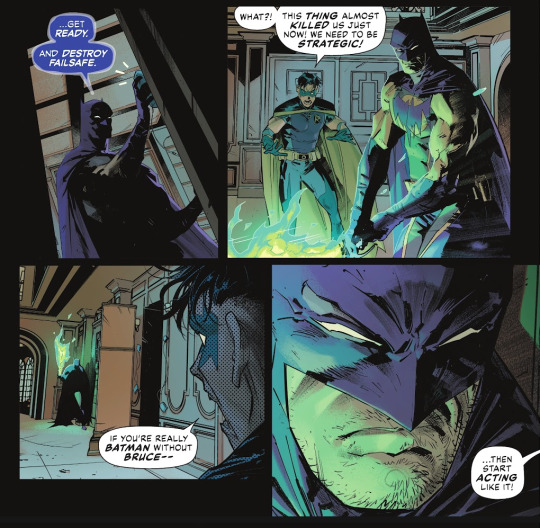
One thing that I like about the above panels is that they lead to another possibility other than what the story presents. We're told that Zur is Batman without Bruce. But as Tim points out, he doesn't really act like it. Batman is always thinking ahead. He's always thinking strategically. It's what makes him Batman.
I don't think Zur is literally meant to be Batman without Bruce... but perhaps he's Bruce's idea of who Batman would be without Bruce Wayne.
Later, during the fight, Failsafe tells Zur that fighting only causes his family pain. Zur responds by saying that they're not family. They're his soldiers. Leading to this fascinating exchange with internal communication...
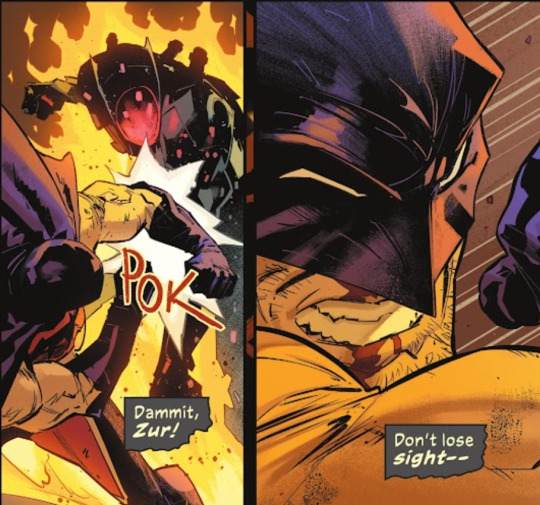
That morphs into an Inner World.
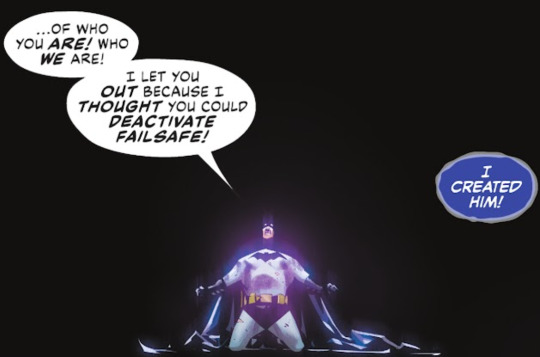
It's not for long, but it's amazing to see these characters interact inside their head.

With that powerful line, Bruce takes control again. Failsafe recognizes him as having switched despite still wearing the same costume.
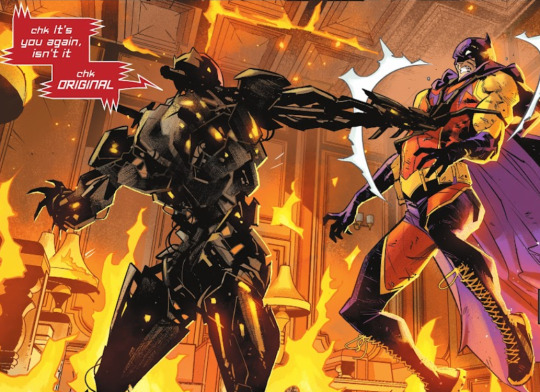
After that issue, Zur is sadly not brought up again in the Failsafe arc.
In the next issue, Bruce describes Failsafe as being made by his subconscious when talking to alter.

Which isn't how a subconscious works, Bruce.
A subconscious is, by definition, not really conscious. Sorry, but Zur is a completely self-conscious entity you made in your head. 🤷♀️
But I guess that works for an explanation for Arthur.
And that's it for... Wait a second...
Zur-En-Arrh YEAR ONE
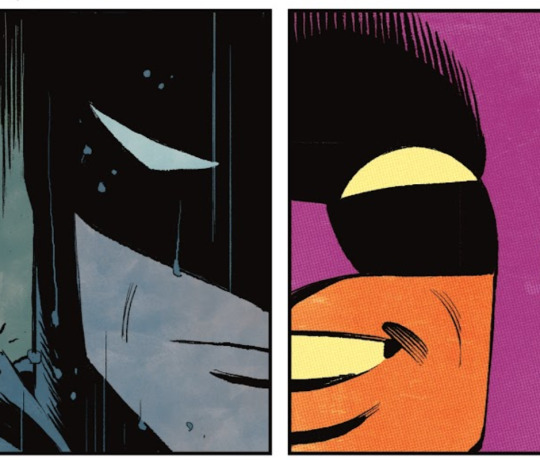
Turns out, the story of Zur isn't just in the Failsafe arc itself, but also in a B story that shows Bruce mentally training himself to create a new personality after a mental attack.
I want to say that Zur-En-Arrh might be a tulpa, but I think there's more going on than that. The name was a distorted version of something Bruce heard from his dad as a child on the night his parents died.
Bruce might not have made an entirely new headmate, but just fed something that was already there. Something that he had repressed.
After the Joker murders a bunch of people, Zur coaxes Bruce to let him take over so he can kill the Joker.
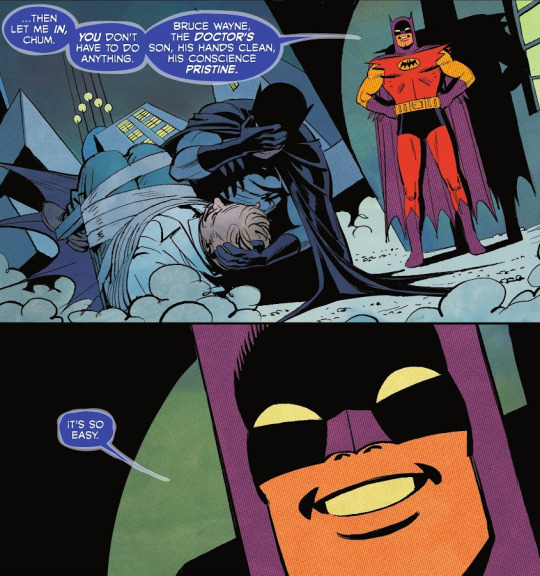
Zur does takeover and Joker, like Failsafe, immediately recognizes.

While Zur tries to kill Joker, he and Bruce are also communicating in their inner world.

After this, we see other characters appear in this inner world such as a version of the Joker meant to represent him before going mad, and a version of Bruce's mother.
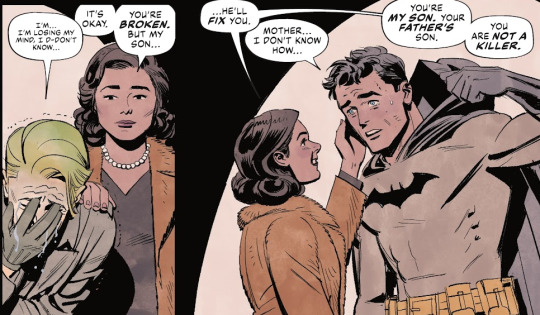
Placing either of these as plural headmates is difficult. They don't front, and don't appear more that I'm aware. I'm inclined to classify them as only Ephemerals. Although, if there are more times they appear... and especially if they retain autobiographical memories between appearances, then I might want to look more deeply into that.
Martha unmasks Zur and shows what's underneath...

The appearance makes sense to me. If Zur is supposed to be the perfect Batman, then what does he need anything under the cowl for? And at the time, he wasn't very developed, only fronting the one time and not really existing much before that.
I wouldn't describe Zur as nothing but hollow anger though.
Yes, the anger is there, but so is a purpose. He's willing to kill because he views it as the right thing. Anger, yes. But he's also doing what he was made to do, what Bruce created him for, in his own way.
Bruce saves the Joker, and continues developing Zur... but he instills his own moral code into him, making certain that Zur won't be a killer after that. Which we can tell works since Failsafe was programmed by Zur to not kill anyone but Bruce.
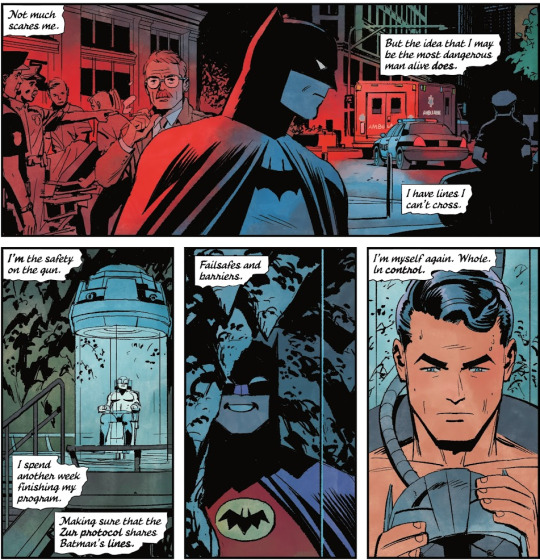
It's unclear how this actually works. But I like that the solution wasn't just getting rid of Zur. Ultimately, Zur wasn't evil. At least, no more than Red Hood who had similar goals and methods.
Conclusion
There you have it! Batman is canonically plural!
This was a really fun read and I'm a huge fan of Zur's dynamic with Bruce for the little bit of time we get to see it in Failsafe.
There are also a lot of ways to play around with this that I hope we can see someday. A situation where Bruce actually has to work with Zur would be really cool. Maybe fighting against some invader breaking into their mind to extract information, forcing them to team up to face it together.
I also would love to see a story where Zur is frontstuck and has to work with Bruce's allies and build his own unique relationships with them. Or even has to pretend to be Bruce Wayne in public without giving anything away.
There are a lot of fun places to go with the character if the writers don't decide to put him on ice for another decade-and-a-half!
179 notes
·
View notes
Note
Calvin and Hobbes are an endogenic system and I will die in this hill
I'll die on that hill right there with you!
46 notes
·
View notes
Text
Living with a “Problematic” Fictional Identity (And Where to Go from Here)
During my panel at this year's Othercon, I promised to publicly release the script I read from. This is that script: this is what I said before the Q&A and discussion portion of the panel. Once the recording of the panel is live, I will reblog this with a link, as quite a few people expressed interest in it. (I have been informed that my voice was paramount for proper enjoyment of the panel; I don't know if that's quite true, but it's what people said.)
Here is the blurb I originally wrote for the panel on the schedule:
A lecture followed by questions and discussion about navigating through life with a “problematic” fictotype or as a “problematic” fictive. How to find community, how to cope, what responsibilities we may or may not have, what morality means for us and where the line between choices “then” and choices “now” lies.
Now, for the script itself.
Introduction
Greetings, people, creatures, and other beings. Welcome. This is a panel about how to live with “problematic” fiction-based identities, and I am someone with one such identity. My name is Goratrix. I am a fictive. Back in my source of Vampire: the Masquerade, I did quite a few bad things, the details of which I will not go into here or now. If you’re curious, I have written entire essays on the topic. Suffice to say that many of my actions were morally repugnant to most, making me quite the moral quandary to some people who encounter me online in this strange reality I have found myself in. Presumably, quite a few of you have had a similar experience—whether you be fictionkin, a fictive, or something similar, or just know someone who is, some of you undoubtedly have identities that are not as squeaky clean as some people would like. Perhaps they are voluntary, perhaps they are not. Perhaps you regret the things “you,” as in, your identity, did, or perhaps not.
Today, we are here to discuss that, how to live with it, and where to go from here.
I will say this: I am going to be making a case for universal acceptance of people with identities like these. Yes, even those people. Yes, even people that did that, whatever you are thinking about. If you disagree with me, that’s fine. I will be happy to discuss and debate this—respectfully—in the later sections of the panel or after it ends. If the concept of accepting people despite their crimes in another world upsets you, please feel free to leave the panel at any time. I will not notice and I will not mind. That being said, those who want to have respectful conversation or have respectful questions—whether they disagree with me or not—will have time at the end of the panel to speak up. I can’t take questions during the lecture effectively because I am easily distracted and long-winded; a bad combination for staying on-script. So, please, hold your questions for me until I open the floor for them. There will be multiple opportunities to speak up, and I will take suggestions and feedback on certain topics throughout the panel. Thank you all for understanding and cooperating. To head off one question, though—if you are wondering if I always talk like this, yes. I do. You get used to it.
Special thank-you to Chaiya, Pale, Rani, and everyone else who gave feedback and/or encouragement during the writing of this panel. I think I would have been reduced to ash without them.
Initial Discussion
No matter what way you spin it, there are identities out there that people don’t like. In a broad sense, this is more obvious: there are bigots worldwide. In our community, however, this can be a little harder to spot if you aren’t one of the affected, and it can be all-consuming if you are. Syscourse and purity culture plague us, as do accusations of being abusers and varying ableist claims of us being “sick in the head.” Ironic, coming from those battling to get recognition for their kintypes and headmates at all, don’t you think?
Attacking someone for who they are is ridiculous. Most people do not choose their identities, problematic or not. A common argument in the otherkin community against outside harassment is that you do not choose to be ‘kin—you just are. Must I spell it out? Must I explain that there is no difference, here, between someone whose kintype is a wolf and someone whose kintype is a murderer? The identity simply is. By attacking or allowing harassment of these “problematic” people, you are indicating that the entire community deserves harassment. Furthermore, people are not responsible for the actions of their kintypes. Yes, they are their kintypes, but did they make those decisions now, as they people they are, now? Typically no. They did not choose to be this, they did not choose the actions; leave them be.
Ah, but Goratrix, you may be saying. What about the people that did choose their identity? And what about fictives, who have no distance between their sense of self and their fictional identity—their “fictomere,” as we call it on the fictionkind Dreamwidth?
I shall address voluntary identities first. There are a thousand and one reasons to voluntarily identify with, or on some level, become, a character or creature. (Some would argue that the line of voluntary and involuntary is rather blurry in places, which I agree with, but that is not in the purview of this panel.) Perhaps they are coping with something, maybe even the thing that the character is guilty of. Perhaps not. Perhaps they see a shred of who they could have been in this character, given different circumstances, and see them as a different version of themselves to be integrated into their personality and considered. To be quite honest, it’s none of our business. Identity is a deeply personal thing—especially identity that you choose for yourself—and judging anyone, for any reason, based on it is going to get messy, unpleasant, immoral, and run into exceptions left and right. Who’s to say which exceptions are allowed, and which are not? Who’s to be the referee on the harassment of the “right” “problematic” identities? You see how this can go wrong, I imagine. And, furthermore, once again, these people did not perform these actions in this world, in this life. If you were to go to the authorities about these people, accusing them of a crime or some immoral act, with no evidence other than “they identify as a fictional character that did this,” you would be laughed off the block. These people have done nothing wrong, and I implore that those of you who disagree please consider why you disagree. Have you considered why they took on the identity at all, or are you just experiencing a kneejerk reaction? Put yourself in their shoes, just for a moment. Consider what might make you take on such an identity, and try to see it in other people. Assume the best, for assuming the worst tears you down as quickly as it tears down those around you, and, speaking as someone who repeatedly assumes the worst in people, it can destroy your life. Do better than I did; grow from this.
Now, onto the topic of fictives, of which I am one. There is frequently a distinct divide in fictotype and fictive; while someone is their fictotype, in many cases they are also separate from it, in that they have lived a life separate from their fictotype in this world. (Note that I am speaking generally, not completely—generalization is necessary for conversations like this, and I apologize for those who do not fit in with such generalizations or the words I am using. I am speaking largely from personal experience within my system.) Fictives are not that way, or at least, are not that way initially. (Fictives can change into very different people upon exposure to this world and time spent living in it, something I know well from watching my headmates and fictives in systems I have befriended.) Fictives typically appear in the system as if they’d been plucked straight from their source, from their life. They are precisely the people who made their life choices, and in some cases, those choices are abhorrent to your average Internet-goer. In my case, my morally questionable decisions include murder, betrayal, and human experimentation, among others. Does that not make me a criminal, worthy of damnation?
I argue: no. It does not.
Why?
Because the circumstances that led me to make the choices I did do not exist in this world. I have been here for almost a year, and have done nothing that others would consider “wrong,” as far as I am aware. (This is a record for me.) Why is that?
My source is Vampire: the Masquerade. My nightly life was filled with political, scheming, ancient vampires that would backstab me given a moment of weakness, a second of hesitation. I had to be ruthless, conniving, murderous, or I would be cut down, and I refused to let myself be killed by the world I had been thrust into, nay, that I had clawed my way into living in, desperate to survive. I considered those things that I did necessary, even “right”—in the situation I was in, the standards for “right” are quite low, and if you are keeping yourself and those you care about alive without harming others merely for the fun of it, you are doing quite well.
This world, and my system’s placement within it, does not force me into those kinds of situations. I have no need to kill, backstab, and lie here, and I argue that if I did, it would not be wrong of me to do so, because trying to merely survive is not wrong. People do what they must, and fictives, even the ones who seem the most horrible, were forged by circumstance just as I was. Hell, this applies to fictotypes, too—people do what they must to survive.
All right, say circumstances were not life-or-death and someone still did something you consider “wrong.” Can they be harassed?
No.
Let me bring up my theory of morality: people do the best they can in the circumstances they are in with the information they have. What is “best” depends on nothing more than prioritization—in my mind, that is all morality is: prioritization. What is more important: the life of an animal, or the life of a human? Someone’s bodily autonomy, or someone else’s life? Your life, or someone else’s? Your pocketbook, or someone’s livelihood? All morality can be broken down this way. Moral debates happen when two or more people have different moral priorities, and consider each other’s prioritization to be “wrong” in some way. I am not free of this; I find people who are willing to harm others for mere entertainment to be doing something “wrong,” but I do try not to throw bricks when living in a glass house; I know my list of actions better than anybody, and I also know that a morality system where my own survival is paramount (second only to the survival of the one I love) is bound to be seen as “wrong” by many. This does not bother me.
My point, in bringing this up, is that few people believe that what they are doing is both wrong and unnecessary. People may do things they consider wrong to survive, and hate every minute, or may do things they consider right unnecessarily, but people rarely do what they think is wrong for reasons they believe are unnecessary. People’s moral prioritizations are formed by the circumstances in which they are in and were raised. Had I been born into a world with limited or no magic, no vampires—this world—I would be completely unrecognizable. I would be a different man entirely, one that you likely would not consider to be “problematic!” If I had chosen to perform the same actions, unnecessarily, that I did back in my source, when I felt it necessary, morally, for me to do, then perhaps I would be worthy of judgment or retaliation. Furthermore, anything I did in this world would be fair game, because it was done in this world. If I murder someone here, then yes, I should face some kind of retaliation for that. I would have done it here, just as things I did back in the world I am from earned retaliation there. It just seems ridiculous, to me, to judge someone by moral standards that they have no concept of nor connection with, across entire worlds and across the boundary of fiction, when chances are that they were doing the best they could with the way they saw the world. People who are “problematic,” in terms of fiction or fandom, are not inherently dangerous in this world, because of the change in circumstances. And, furthermore—don’t they deserve another chance? A chance to be who they feel is best in these new circumstances?
That being said, no one is obligated to interact with anyone else. If you cannot get over what someone did back in their source, and are uncomfortable with them—fine. That’s your business, not theirs: avoid or block them and move on. Anyone is well within their right to refuse to interact with anyone for any reason. Harassment, however, is over the line, and I think you all know that. Identity is identity; leave well enough alone.
If you are one of these people—as I’m sure many of you are—with a “problematic” fictional identity, you are not wrong for merely existing. You are not alone. You are not doomed to be hated and reviled forever. And, if you struggle with your identity, you are not doomed to struggle alone forever. Let us move now to the topic of coping.
Coping
For fictives, it can be extremely traumatic to come to this world and find out how different things are here. To find out that what you did is so repugnant as to be seemingly worthy of constant harassment and no support—and for fictionkin, learning that your fictotype is someone that did things that you consider horrific can be traumatizing as well. Good God, I cannot even imagine learning that I am, or was, someone who did something that I would consider repugnant. Facing that and coping with it can be hard enough without hordes of strangers getting on you about it. People do not need help in feeling bad for who they are; they do need help in accepting it and handling it in a healthy way.
There are infinite types of trauma, here. My suggestion, overall, is this: approach it with a policy of self-forgiveness. I know it can be difficult, but listen to me: remember my definition of morality earlier. You did what you felt was best with the circumstances you were in and the information you had. Forgive yourself for doing differently than you would do now. Changing your priorities, and thus, your morality, is not hypocritical—it is growth. Let no one take that from you. Let no one take what you find precious in your identity from you, because it may be your past, or a parallel present, or something that your mind latched onto because it was important to you. Let no one take this from you. Forgive yourself, if need be, and never let anyone make you feel like you cannot do that, or like you don’t deserve to do that. Defend yourself from those who would wrong you for the things that were done in your source.
My suggestion on coping and dealing with cruelty from the community is quite simple, but I have found it effective. It comes in two parts: one, block liberally, and two, find a small group that accepts you and stick primarily to them. There are community spaces that facilitate this, but you can also form small groups of friends. Discord DMs, email chains, Snapchat threads, whatever works for you. Block those who will not accept you and allow yourself to befriend those who will. If people would hurt, harass, or exploit you for things done in your source, block them. The block button is there to protect you. You have been given a potent tool—use it. Consider it a form of taking care of yourself, and, if need be, self-forgiveness.
Finding friends you can trust is harder, and admittedly, I am not the best person to ask about this. I have only recently begun to open up, and have gotten lucky with the system’s pre-existing friends. Furthermore, I have had little need to cope with my identity, although I have watched multiple fictives in our system have to deal with it, so my advice here is somewhat limited, but here is another suggestion: work on accepting and understanding your identity. Journal, make posts, do long-form writings, answer prompts—whatever helps you unpack everything, whatever helps you understand and record, do it. I thought it silly, at first, but after I started doing longform writings, I never looked back—I enjoy them immensely, and wish I had more time for them.
I believe it best to open the floor for a few minutes for suggestions on both coping and finding an accepting group, including community spaces. I know of the fictionkind Dreamwidth, of which I am an administrator—where else is there that accepts people such as us? How do you find accepting friends? How do you cope? Leave your suggestions in chat. Let us have a brief conversation before we move on.
Growth
Let us continue, now, on the topic of healing and changing. I spoke earlier of morality being shaped by circumstance, and of our ability to alter our morality via reprioritization, something fairly common in fictives especially. (After all, fictionkind tend to have their own sense of morality before awakening as fictionkind, as do those with heartypes and most other identities.) We are capable of doing this—changing from what we are and were—but I ask: are we obligated to do so? Must we become “good” people, model citizens of the world we now find ourselves in? I say no—as long as you are not bringing direct harm to others, it’s no one else’s business who you are, what you feel, what you believe. You should not be forced to change your very identity and sense of self just because someone else does not like it. The self is the most intensely personal thing about anyone, and it is no one’s business but yours.
However, I am also not saying that you should act with impunity here just as you would back in your source. Chances are excellent that you can’t get away with what you would, there, and if you’re a fictive, you could hurt your headmates or get them in trouble. I will not presume to tell you how to handle dealing with your headmates (or whatever word you use to describe them), but I would advise not harming them intentionally. Chances are, you are stuck with them, possibly for the long run—does it not make sense to try to get along with them? I will leave that in your discerning hands, however.
I won’t tell you how to live your life, but I will recommend that you think carefully about what parts of your behavior you want to perpetuate moving forward. This should always be considered every time you enter a new, drastically different, situation: this is just one of the most drastic. When it comes to myself as an example, I did not have to think on it much: I don’t enjoy hurting people, I just did so out of necessity. Here, I am not pushed to behave the way I did. My cutthroat sense of morality is key to who I am, and I refuse to abandon it, but the objectionable parts of it never come up since I am never pushed into dire straits here. I believe the worst thing I have done so far is threaten to block people who harass me because I don’t care enough to try to convince them on a one-on-one basis to respect me. What a nightmarish creature I am, truly.
If you do not wish to change who you are, just as I did not, but also do not wish to do “immoral” things that would incite reasonable consequences, there is a balance to be struck between “same identity and morals” and “new behavior”--and that balance is different for everyone. I have worked out mine: you will have to take the time to work out yours. If you need a sounding board for that, my inbox is open, both on Tumblr and Discord.
Perhaps you do want to grow beyond your identity, whether you be a fictive or someone with a different kind of identity that influences you in ways you do not like. I think that, if this is something on your mind, it is a good idea: with this kind of thing, wanting it tends to mean you need it. Remember what I said about morality and prioritization: that is a matter of reprioritizing. For other parts of yourself: don’t think about changing what already exists. Think about adding onto it, and the change will come in time. Pick up a new hobby. Make some friends. Play a game, make a playlist of songs you like but don’t necessarily have anything to do with your fictional identity. Get involved in something creative, whether it be making or consuming, and relate to other characters. Modify your behavior in ways that make you happy, but remember two very important things: one, never change yourself because someone else wants you to, and two, changing who you are is not hypocrisy, it is growth. No one stays stagnant forever, even those of us who cling to our identities because we do not wish to move beyond them: even as myself, as Goratrix, I grow and change, but well within the bounds of what people would think is still Goratrix.
What Now?
So you have this identity steeped in fiction. So you have heard all of what I have to say thus far. Perhaps you are accepting this identity, perhaps you are struggling with it. Perhaps you want to connect with and understand it more, perhaps you have feelings you need to get off of your chest, perhaps you want to move on from it. What now?
Find community.
I cannot express enough how much community has helped me in accepting my current place in this world, who I am, and why I did the things I did—and why I do the things I do now. I am changing, just as everyone does, and accepting that has been difficult. I am more social in a positive sense than I have been since my pre-vampirism days (which was about a thousand years ago) and I had a hard time accepting that until I began to make friends in the community who I legitimately enjoy speaking with.
Communities of this type, I’m sorry to say, cannot be found in broad social media spaces like Tumblr or Twitter. It’s too chaotic, too public, too out there—smaller communities are our best bet. Earlier, I asked you all to give me examples of community spaces where people like us can go to find refuge and no judgment while we work through, or even just live as, our identities—I recommend going through those and finding places that you feel might work for you. Again: I run the fictionkind Dreamwidth—which, despite its name, welcomes anyone with any kind of fiction-based identity—and we put up with no harassment or judgment of any type. That kind of behavior gets corrected, and if it continues, the offending party is removed. There are plenty of spaces for people who want to be judgmental and downright bitchy: let us have our havens, of which there are precious few. It is vital that your only external acknowledgement of your identity not be toxic—the self-hatred and emotional damage that can result from that is something that I am sure many of you are all too familiar with.
I will say, however, that “community” does not mean “fandom.” I do not recommend engaging with your source’s fandom in the context of your identity: in most cases, this will lead to misunderstanding and harassment. Many people with fiction-based identities avoid fandom, period—I am one of these people. I cannot stand it. This goes doubly so for interacting with creators of a source in your capacity as your fiction-based identity—I recommend that you do not engage with them outwardly as this. This cannot go well: it will only make you and them uncomfortable. The possible exception to this is when it comes to, say, having an identity based on a friend’s OC or similar—since they know you, or a member of your system, they might be more accepting, or they might be more upset. Know that you did nothing wrong in having this identity, and that it may be best to not tell them to avoid the potential hangup of them getting upset at the implication that you know their character better than they do. I would typically err on the side of not saying anything, but I will leave that in your capable hands. You may want to get advice from community members on a case-by-case basis if you are unsure of how to proceed.
In addition to finding community, I recommend that you do writings on your identity. They don’t have to be pages and pages long: just a few paragraphs journaling your experiences would do. Write essays if you’d like, or just bullet-pointed thoughts. Answer prompts. Do creative writing exercises. You can keep these to yourself, or you can post them, which I would encourage. It can be immensely helpful to a newly-awakened or formed individual to find writings, no matter how small, from someone like them. The feeling of “thank God I’m not alone” cannot be underestimated.
Post them on your blog, or in your smaller community. Post them on your personal website—yes, your personal website, which you should have if you do any significant amount of writing, just ask Page—or anywhere else you can slot them in. Write for yourself, and write for your past self who may have wished that there was more out there to guide them and make them feel like they were not alone. I know I wish that there had been more out there when I formed—other VTM fictives, more writings from other “problematic” beings. Write to understand and accept yourself, write to heal from any damages inflicted on you because of or by this identity, write to leave something for future wanderers of our breed—whatever your reason, I implore you to write. Write and find community: spend time with people. Find elders of your community and speak to them—they have more insight than you can imagine, more ideas than you realize, and less time and energy to implement them than anyone would prefer.
If you want to put yourself out there and build community, help run events, do things, excellent. I would love to see it, and I’m sure that others here would, as well. If you want to just exist with your identity, maybe answer a few prompts, talk to some people—that’s all you need. You need not do anything to deserve to exist as you are—you are more than enough, dear listener, and never, ever let anyone tell you otherwise.
At this point, my long paragraphs of thoughts are over. I want to hear what you have to say. I made sure to get as much time as I could for you to ask questions, speak your comments, voice your concerns. This is your time: I am sure many of you have questions, at least. Ask away.
Closing Notes (Post-questions)
Our time is running short, and we must end the panel at this point. I will be available via Discord PM for anyone who still has questions or wishes to speak to me about anything; my inbox on Tumblr is open as well, for those who would rather communicate there or send me something anonymously. Please remember that the anonymous toggle is a privilege, not a right, and if you use it to send cruel or rude messages to me, I will block you without reply and eventually disable the ability to use it.
Before we go, however, I wanted to read you my favorite poem. I formed during last year’s Othercon, and my first memory of this world is Pale reading this poem at the beginning of his panel, which had a similar theme to this one.
This is A Monstrous Manifesto by Cat Valente.
If you are a monster, stand up.
If you are a monster, a trickster, a fiend,
If you’ve built a steam-powered wishing machine
If you have a secret, a dark past, a scheme,
If you kidnap maidens or dabble in dreams
Come stand by me.
If you have been broken, stand up.
If you have been broken, abandoned, alone
If you have been starving, a creature of bone
If you live in a tower, a dungeon, a throne
If you weep for wanting, to be held, to be known,
Come stand by me.
If you are a savage, stand up.
If you are a witch, a dark queen, a black knight,
If you are a mummer, a pixie, a sprite,
If you are a pirate, a tomcat, a wright,
If you swear by the moon and you fight the hard fight,
Come stand by me.
If you are a devil, stand up.
If you are a villain, a madman, a beast,
If you are a strowler, a prowler, a priest,
If you are a dragon come sit at our feast,
For we all have stripes, and we all have horns,
We all have scales, tails, manes, claws and thorns
And here in the dark is where new worlds are born.
Come stand by me.
262 notes
·
View notes
Photo

Arelevant
You may be arelevant if attraction, as a concept, is not relevant to the way you enter relationships. (If your relationships are driven by affinity, curiosity, or some other line of thinking, for instance.) This could be for any number of reasons– discomfort or repulsion about calling your feelings attraction, something like neurodivergence or alterhumanity interacting with the way you form bonds with others, et cetera.
Dark blue: Introspection, self-knowledge, and the highly personal nature of arelevant identity as something experienced in different ways to different people.
Light blue: The inherently vast and not easily categorized nature of people’s feelings for one another.
Brown: Disrupting the paradigm of how we talk and think about interpersonal relationships.
Gold: Common ground discovered in arelevant identity
Compass rose: The many paths that connection can take when not governed by attraction.
74 notes
·
View notes
Text
why our therapist encouraged us to identify as endogenic
long post, personal and therapy stuff
this is our personal experience that we had earlier this year with our therapist. we’re not claiming this aligns with every other system’s experience - we’re just sharing what happened to us and how we’ve been coming to terms with being a system and having osdd-1b.
we have been talking about having multiple people inside our one body for a couple years now in therapy. at first we brought it up tentatively, describing our experience the best we could without the proper language: “my mind is always racing,” “i feel like i’m living someone else’s life,” “i hear conversations in my head i can’t take part in,” “i sometimes feel like i’m watching someone else in my own body,” “my identity seems to flip and change on a dime without me having much say,” were all sorts of things our host or our therapy alter would tell our therapist.
he brought up we might have some sort of dissociative disorder. we were adamant at the time that we were not traumatized (despite having trauma responses and exhibiting symptoms of ptsd). our therapist was okay with this. when we told him we might have just created our headmates, or that they were imaginary friends turned to life, he encouraged us to explore this. he had said something like “whatever gets you guys talking and communicating with each other sounds like a good thing.”
today, we recognize that we were traumatized. our trauma holders have given the rest of us glimpses into the abuse that we suffered, but they still tend to keep it under tight wraps. before this, though, our therapist thought identifying as endogenic or mixed origins would be a great way for us to get to know each other without facing our trauma head on.
so, we went through life thinking we were mixed origins, that most of us had formed in childhood as imaginary friends come to life. identifying as partially endogenic was so freeing for us! it allowed us to get to know each other without fear of encountering a trauma memory, or fully acknowledging the harm that’s happened to us.
we didn’t identify as mixed origins because we truly believed we weren’t abused - we identified this way because it was easier for us than it would be coming to terms with the fact that we faced so much abuse in our childhood! identifying as mixed origins did not prolong our suffering, nor did it fully convince us we had never been abused at all. it actually allowed us to deal with our trauma on our own terms at our own pace! when we learned we were a system, we were not yet ready to face the fact that we had been severely traumatized by one of our caregivers.
our therapist encouraged us every step of the way. even now, we don’t quite have a handle on the abuse we suffered, and that’s okay! he went ahead and helped us receive a diagnosis of osdd-1b, since we exemplify nearly all of the symptoms, and this is a diagnosis we are still coming to terms with.
i guess what we’re trying to say here is, identifying as endogenic can actually be a healthy part of the recovery process. if identifying that way helps your system build communication and trust, than it’s worth it! not every traumatized system can accept that they were traumatized right off the bat - identifying as endogenic may be a way for them to find joy and autonomy on their path to recovery!
if we had not identified as mixed origins, our host likely would still be shutting us down and pushing us away. we likely would be in the same situation we were in years ago. the idea that not all of us formed from trauma helped us distance ourselves from that trauma which, in the long run, has helped us become more open to processing it!
we just wanted to share our personal experience. at this point we recognize that we are a traumagenic system, but we never would have come to this realization if we at first hadn’t identified as mixed origins. so we don’t believe that people identifying as endogenic is anti-recovery, whether or not they have past trauma that they can recall! it’s honestly anti-recovery to gatekeep those who identify as endogenic from the plural community!
tldr: our therapist actually encouraged us to identify as endogenic despite having trauma if it would make communication between headmates easier. identifying as mixed origins is what led us to self acceptance, and we would likely still be in denial if we had never identified as an endo. being an endogenic system isn’t anti recovery, but shaming or fakeclaiming someone for being endogenic is anti recovery.
86 notes
·
View notes
Text
Characters VS. Alters
I want to talk about my experience with having characters vs. alters. Obviously, this post is just talking about my own experiences and I know that it’s not the same for everyone. Hopefully you guys find it helpful or interesting, though!
So, I’m an author and my original characters are living rent-free in my head. They feel autonomous and have their own thoughts and opinions and interactions with each other. Characters can develop themselves…I love that about them lol! Sometimes I let my characters loose in imaginary scenes to see what they do on their own. Sometimes I step inside of them to experience their thoughts and understand their actions better. Sometimes I ‘become’ them. I think these are all normal parts of the creative process.
When I was younger, I had the belief that my original characters were actually real people. Some of them existed in separate worlds, but I could also imagine them in the real world too. I could see them right in front of me if I wanted to. I genuinely felt like they were real people. None of that was distressing. It helped me cope with the aftermath of trauma I was unknowingly enduring and provided me a lot of comfort and creative energy.
When I see people describe their experiences with non-disordered plurality, I find it relatable sometimes. A lot of people describe it similarly to how I experience having characters. I’m not trying to say that this is what all non-disordered plurality is like, though. I just find it interesting.
My experience with my alters, on the other hand, has been nothing like any of this. I think these 3 words best explain the difference between my alters and those other experiences: knowing, understanding, and accepting.
Knowing:
I know I have characters. I can’t tell you the exact amount (probably thousands), but I know which ones are mine and which ones aren’t. If you showed me a character I made, I’d be able to go yeah that’s my character and I made that. I could tell you many facts about them like their name, pronouns, species, orientation, what they mean to me, etc. Even if it feels like they develop themselves sometimes, I know that development occurred. Even if it feels like they’re autonomous and do things on their own sometimes, I know that they’re doing that. For their entire existence, I have known about them.
It’s the complete opposite with my alters.
I didn’t know I had alters for the longest time. When I finally found out I was a system, I still didn’t know many of my alters. When new alters showed up, who had always been there with memories that sometimes stretched back even further than my own, I was shocked. I never knew about them before, even though they existed alongside me my whole life with evidence to prove this.
Currently, I still have no idea how many alters there have been. I can’t even guess an amount. It would be like trying to guess how many peanuts are in a jar that I’ve never seen before. It’s not the same as having so many OCs that I can’t count them anymore. I have seen that peanut jar, and I put every single peanut inside of it. It’s different.
I could hardly tell you any facts about my alters. I didn’t know what their names were, let alone what they were like, or that they existed before I realized they were there. It stretched beyond that. I didn’t know aspects of my own life, like our past and very crucial memories–both happy and upsetting. I didn’t know these things. And the alters often didn’t know all these things either.
When we did know about something, we often had no idea what they were or why they existed!
Understanding:
With my characters, I understand what’s going on. I understand when they develop themselves, when they interact with each other, when they interact with me, and I understand the scenes that play out. It doesn’t have to make clear sense all the time, but I’m still able to comprehend that it’s what I’m experiencing. It doesn’t feel out of my control, but I wouldn’t say I’m actively controlling it either. It’s like an unconscious function of the mind for me.
Once again, my experience with alters is different.
For the longest time, I couldn’t understand my alters. Their actions with my body, their thoughts and feelings that sometimes bled over–I couldn’t comprehend it. They couldn’t comprehend it, either. It felt completely foreign. This often led to situations like our journal entries being scribbled out because “I’ve never felt or thought those things before”, not knowing why beloved projects were suddenly deleted, and feeling dumbfounded while the body is sobbing uncontrollably because “I’m perfectly fine”.
Once again, it extends further than just the alters. Those aspects of my life that I was suddenly confronted with…some of them I just couldn’t understand. There were specific memories that I spent years trying to figure out. There were feelings, thoughts, and behaviors that I couldn’t comprehend, yet they were originating from within me. Why am I feeling this? Where are these thoughts coming from? What is that? Who is that? Who am I? What happened to me? Why?
My characters don’t do that.
Accepting/Believing:
The last thing is acceptance. When I say acceptance, I’m talking about fully believing in something. I accept that my characters are characters. I accept who they are and the things they do (even if I don’t agree with them). I accept their origins. I accept that I created them, that I am an author, that they are a part of reality for me. I fully believe in these things, it’s not something that needs to be questioned.
Dissociation is when you’re unable to fully accept reality. Dissociative identity disorder is exactly what it says on the tin.
I couldn’t accept my alters without years of therapy and trauma processing. I can’t tell you how often it felt like they weren’t real. We came up with every excuse possible to say that each other doesn’t exist. The DID doesn’t exist. The trauma doesn’t exist. You aren’t real, but I am. I’m real, but you aren’t. Neither of us are real. We’re real, but the DID isn’t. The DID is real, but we’re not. We found every excuse.
It’s one thing to know and understand that my alters come from trauma, but it’s another thing to fully accept that. To fully accept their origins and that they’re parts of me is to fully accept that these terrible things happened to me to. The thoughts and feelings they have that might overwhelm or scare or disgust me so badly are parts of me, as well. I’d have to accept that my own imagine of who I am isn’t complete, and they’d have to accept that too. Then, we’d have to bring each other into our image of who we are. Obviously, that’s hard as hell to do. Literally goes against what the disorder wants.
Extra:
So, yeah, the two experiences are very different for me. When I was able to start knowing, understanding, and even accepting my alters, though, I can still see differences. Alters are more like compartmentalizations of my life and who I am as a person; we all make up the same person. My characters…aren’t who I am. Sure, they come from my mind and I gifted most of them traits from myself. But they don’t make up who I am as a person. You don’t read a book and feel like you know who the author is by combining all of the characters in your mind. The characters just aren’t the author. They’re a creation from the author’s creativity. That’s something separate.
I didn’t create my alters in the same way I didn’t create myself. We were all born on the same day, in the same body, in the same mind, and have experienced the same life. Not all of us know, understand, or accept that but it’s how it is. Idk if that makes sense but hopefully it does.
This is how I’ve been able to distinguish between these two experiences. This isn’t something I see talked about a lot. Feel free to share your own experiences if you want!
#this is extremely interesting#as a thoughtform fictive i do feel seperate from my 'fictional self' but it took a while to get to that point#my host does have characters they interact with but the characters aren't constantly aware of the world the way i am#i feel like i also started out more of a character but through interacting with the world began to see myself as a person#at a certain point the difference between a character and a thoughtform is really just a semantic one and one of preference#if i were to come up with a litmus test i'd say that#a thoughtform is a character who no longer wants to be confined to the headspace. who wants to act and be recognized in the real world#and insists on this desire until they begin to act in the world as themself and be influenced by it#developing a sense of selfhood#sometimes it scares me to think that there's no real definable difference between me and a character in my host's head#but i think that's what differentiates me from a fictional character#if that makes any sense & i'm not speaking into a void
82 notes
·
View notes
Text
What people think having fictives is like: I get to hang out with and talk to my favorite character whenever I want to!
What it's actually like: Please let me get through this episode where you're acting cringe I'm begging you
#DYING#this was mina exactly lol he would NOT let me get through his source without panicking and making everything feel awful#i did figure out that pausing it and checking in from time to time helps a lot if anyone needs that tip#having a fictive from your hyperfixation that hates their source is. well it's an experience for both of us 😂
209 notes
·
View notes
Photo
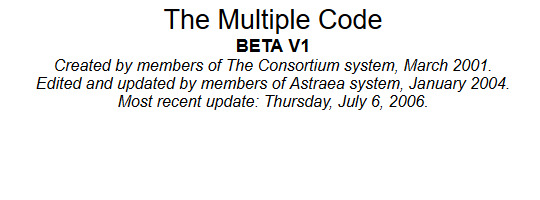

[image description: The first image is a screenshot pointing out that on older website called the Multiple Code was created in 2001. The second image is a screenshot pointing out that “walk ins”, “reincarnations”, “channeling”, “gateway systems”, and “natural” systems are listed under possible system origins.]
While the term “natural system” has fallen out of use, we decided to post this here just to show (once again) that the concept of many different types of systems have been accepted by the multiplicity community for over seventeen years. It also accepts that systems can be of mixed types.
This is hardly the only site like this.
The multiple community has a wildly inclusive history. Tumblr can’t erase that.
123 notes
·
View notes
Text
@funnier-as-a-system
ever have a blorbo live in your brain for so long they become their own blorbo variant that’s no longer fully attached to their source material and your original blorbo is still beloved and dear to you but now you also have a mutant blorbo clone who is dear to you in a different way?
44K notes
·
View notes
Note
Plegg culture is believing that surely you can't be plural despite talking to the same Man in Head for years because you don't have DID
.
30 notes
·
View notes
Text
“Gaslighting is a form of psychological manipulation in which the abuser attempts to sow self-doubt and confusion in their victim’s mind.“
“You are not a real system, you are just roleplaying” is doing exactly that. You do not know that person’s experience. You do not know what they are or are not experiencing. You are not qualified to determine whether or not they are experiencing something or not.
Just because I have depression does not mean I am qualified to determine if someone else does or does not. Someone not having the same experience with depression as me does not mean they do not have depression.
You are not an authority. No one owes you the respect of an authority. You are not the arbiter of who has and does not have an experience.
234 notes
·
View notes
Text
Hi! We'd like some more mutuals!
We're a radically inclusive mixed origin system of unknown count. We're queer in various ways, autistic, adhd, and we're also writers!
Our main focuses are sifi, fantasy, and poetry.
We have special interests in mathematics, physics, medicine, D&D, and a few other things.
If you wanna be mutuals, just follow us! We'll follow back, it might be delayed a bit, but we will!
32 notes
·
View notes
Note
All this "systems only form before *age*" stuff is why i was terrified about having repressed memories when I was a new system. Now I know when we split and am able to be secure in spite of the bullshit but christ, it didnt make me doubt i was a system, it made my paranoia 5x worse when im already psychotic. These people would rather trigger psychosis then let people vibe because "theyr're good people"? really?
I am really fucking worried about how much they keep insisting people must have childhood trauma they just don't remember, because that is genuinely how you create false induced trauma memories if you keep it up enough.
And even in cases where people do have trauma, they might not remember for a reason? They might not be ready yet? Forcing people to confront trauma before they are ready is fucked up too.
They don't seem to care about who they hurt, as long as they can maintain their tidy little narrative.
86 notes
·
View notes
Note
plural egg culture is feeling a deep attachment to characters in media that were presented as two or more characters sharing a body (such as Greed and Ling in Fullmetal Alchemist or Crona and Ragnarok in Soul Eater) and being like "that's weird, I'm a singlet so I must relate to them for some other reason."
.
34 notes
·
View notes
Text
there should be a variation of blorbo but for kintypes
28 notes
·
View notes
Text
If he’s Blorbo from your shows why is he in my system
886 notes
·
View notes